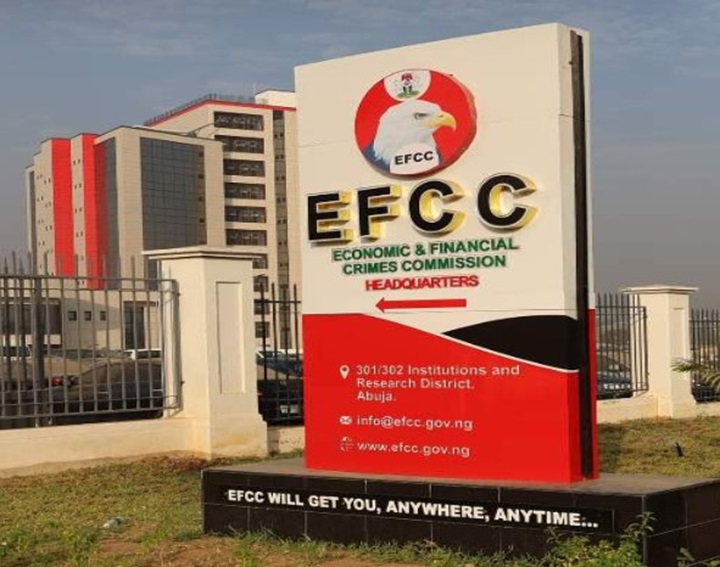The Economic and Financial Crimes Commission (EFCC) has declared Auwalu Tijjani, a businessman from Kano State, wanted in connection with a high-profile case involving the alleged laundering of $1.9 million. The anti-graft agency made the announcement on Thursday through an official public notice, urging Nigerians with useful information about his whereabouts to come forward.
According to the EFCC, Tijjani is being sought for offenses bordering on money laundering, criminal conspiracy, and obtaining money under false pretenses. The Commission alleges that Tijjani was involved in a complex financial scheme designed to conceal the origins and movement of illicit funds totaling nearly $2 million, which were allegedly funneled through both local and foreign accounts.

In a statement issued by the Commission’s spokesperson, Dele Oyewale, the EFCC revealed that Tijjani had absconded during the course of the investigation and has since refused to respond to repeated summons. The agency has now listed him as a wanted person and has circulated his photograph and personal details to law enforcement agencies across Nigeria and Interpol channels worldwide.
“The public is hereby notified that Auwalu Tijjani, whose last known address is in Kano State, is wanted by the EFCC in a case involving alleged money laundering to the tune of $1.9 million,” the statement read. “Anyone with useful information on his whereabouts is urged to contact the nearest EFCC office or the nearest police station.”
Preliminary investigations suggest that Tijjani operated a network of shell companies and bank accounts, which he allegedly used to transfer suspicious funds under the guise of legitimate business transactions. The EFCC believes the funds in question may be linked to proceeds of fraud or other financial crimes, though full details remain under investigation.
Sources close to the case indicated that Tijjani allegedly forged documents, falsified business contracts, and manipulated foreign exchange procedures to launder the funds through a series of corporate entities and offshore channels. He reportedly used parts of the funds to acquire luxury vehicles and real estate properties, some of which are currently under EFCC surveillance.
While the Commission has not yet disclosed the full identities of possible collaborators, insiders say more suspects may be invited for questioning as the case unfolds. The EFCC is also reportedly working with the Central Bank of Nigeria (CBN) and other financial regulators to track the movement of the funds and determine whether any regulatory infractions occurred.
The announcement has stirred significant attention in Kano and among Nigeria’s business community, especially given the scale of the allegation and the growing spotlight on illicit financial flows. Legal experts have noted that if convicted, Tijjani could face up to 14 years in prison under Nigeria’s Money Laundering (Prohibition) Act.
This development comes amid EFCC’s renewed efforts to clamp down on high-value financial crimes, especially those involving foreign currency transactions and cross-border financial schemes. The Commission has intensified its enforcement activities in recent months, targeting politically exposed persons, corporate actors, and individuals suspected of engaging in economic sabotage.
Observers have welcomed the EFCC’s move, calling for transparency and accountability in the investigation and urging the agency to strengthen its asset recovery processes. Civil society groups have also called on the judiciary to expedite money laundering cases to ensure that justice is served and public confidence in the anti-corruption fight is restored.
Meanwhile, the EFCC has appealed to the public to be cautious and report any suspicious dealings involving foreign currencies, as the country continues to grapple with economic instability and foreign exchange volatility.
At the time of reporting, efforts to reach Tijjani’s known business associates and legal representatives were unsuccessful. The EFCC has assured that all legal channels are being explored to ensure that Tijjani is brought to justice, including the possibility of issuing an international arrest warrant if he is found to have fled the country.
Members of the public who may have information about his location are encouraged to contact the EFCC via its hotlines, social media channels, or in person at any of its offices across the country.
As Nigeria intensifies its battle against financial crimes and illicit capital movement, the case of Auwalu Tijjani will likely serve as a litmus test for the EFCC’s ability to investigate, apprehend, and successfully prosecute high-profile suspects involved in complex financial fraud.
Support InfoStride News' Credible Journalism: Only credible journalism can guarantee a fair, accountable and transparent society, including democracy and government. It involves a lot of efforts and money. We need your support. Click here to Donate
